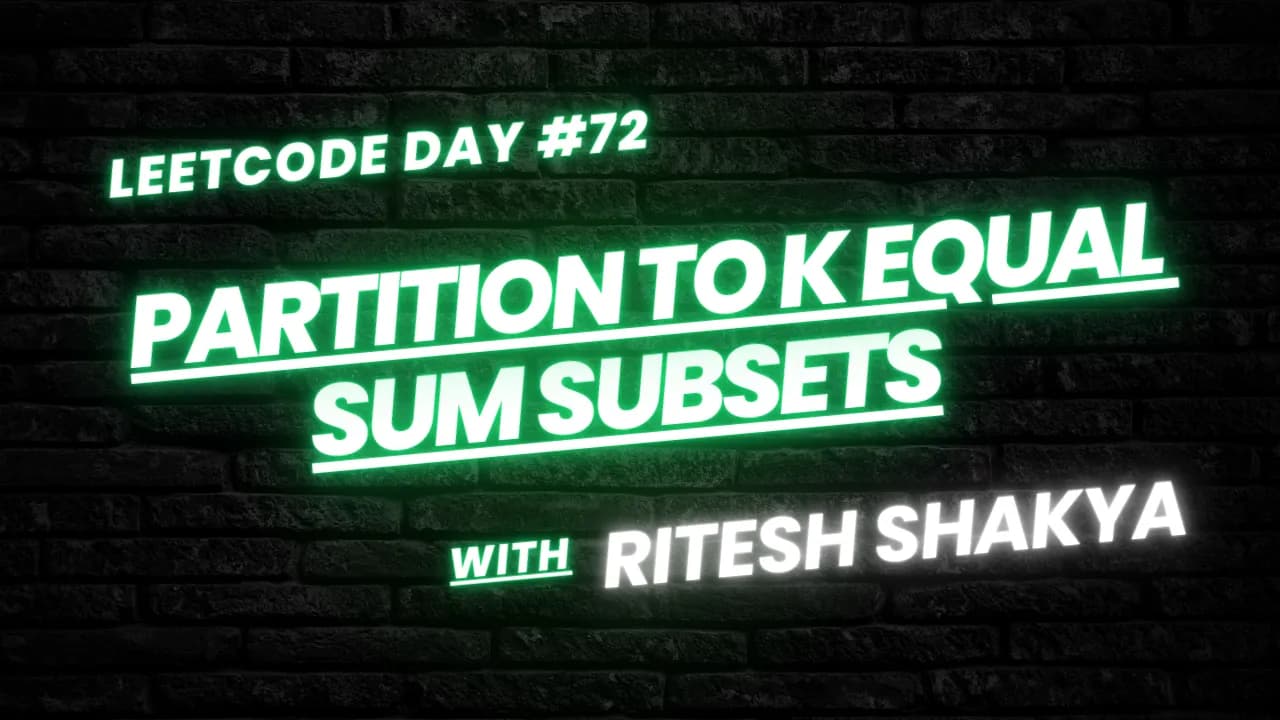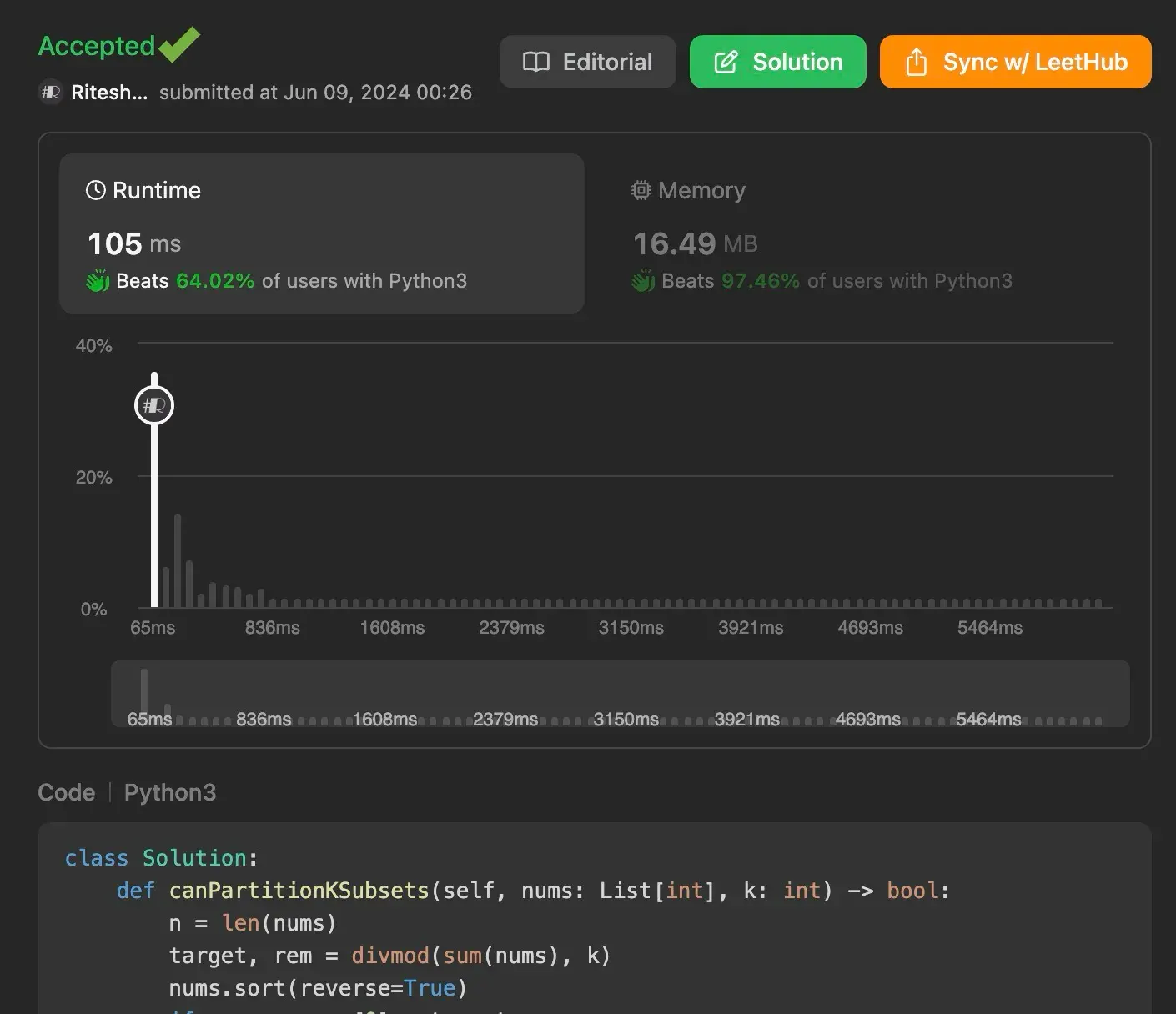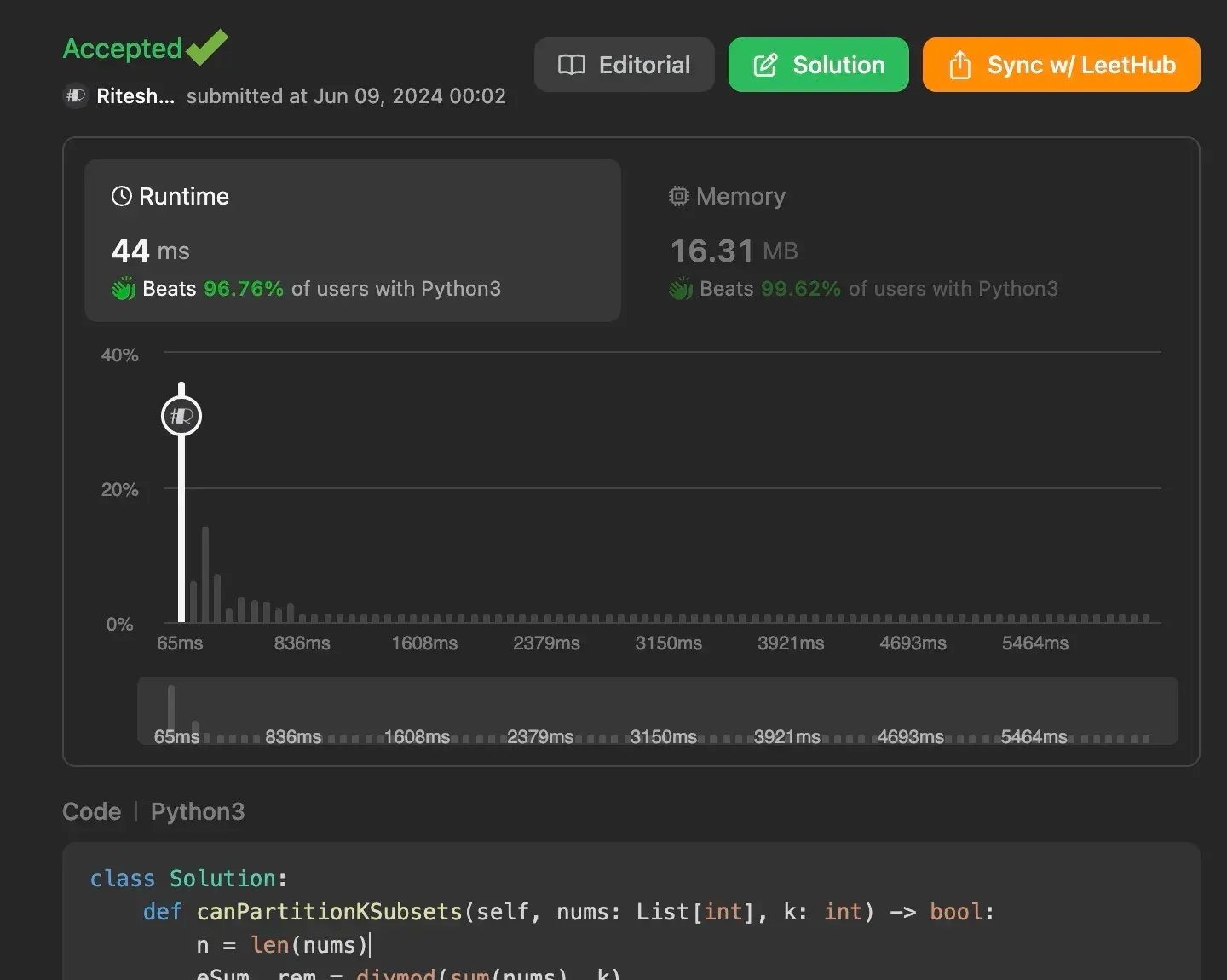Welcome to another problem-solving journey in the world of algorithms! In this article, we’ll dive into solving the problem of partitioning an integer array into k non-empty subsets with equal sums. We’ll explore the problem, understand different approaches to solving it, and analyze their time and space complexities.

If you’re just joining us, it might be helpful to catch up on the previous entries. Want to see more problem-solving techniques? Follow me here on my blog!


Understanding the Problem
The problem requires us to determine if it’s possible to divide an integer array nums into k non-empty subsets such that the sum of each subset is equal.
Example 1:
Input: nums = [4,3,2,3,5,2,1], k = 4
Output: true
Explanation: It is possible to divide it into 4 subsets (5), (1, 4), (2,3), (2,3) with equal sums.
Example 2:
Input: nums = [1,2,3,4], k = 3
Output: false
Using Efficient Approach: Depth-First Search with Pruning
The goal is to utilize depth-first search (DFS) combined with backtracking to explore potential partitions. We’ll implement an efficient solution by leveraging sorting and pruning techniques to eliminate infeasible paths early, thus reducing computational complexity.
def canPartitionKSubsets(self, nums: List[int], k: int) -> bool:
n = len(nums)
target, rem = divmod(sum(nums), k)
nums.sort(reverse=True)
if rem or nums[0] > target:
return False
used = [False] * n
def dfs(index, total, k):
if k == 0:
return True
if total == 0:
return dfs(0, target, k - 1)
for i in range(index, n):
if i > 0 and not used[i - 1] and nums[i] == nums[i - 1]:
continue
if used[i] or total - nums[i] < 0:
continue
used[i] = True
if dfs(i + 1, total - nums[i], k):
return True
used[i] = False
return False
return dfs(0, target, k)
Explanation
- Initial Setup:
- Calculate the expected sum (
target) for each subset and check if the total sum is divisible byk. - If the largest element exceeds
target, partitioning is impossible.
- Calculate the expected sum (
- DFS Function:
- The function
dfsis defined to try and form subsets recursively. - Base Case: If
kis zero, it means we’ve successfully formedksubsets and return true. - Subset Formation: If the current subset sum (
total) reaches zero, we attempt to form the next subset. - Element Inclusion: We iterate over elements starting from the given
indexand attempt to include each element in the current subset:- Skip if the current element is the same as the previous and the previous wasn’t used (to avoid duplicates).
- Skip if the element is already used or if it exceeds the remaining sum required for the current subset.
- Mark the element as used and recursively attempt to complete the subset.
- If unsuccessful, backtrack by unmarking the element.
- The function
Time Complexity: O(k x 2 ^ n) in the worst case due to the exploration of subsets through recursive calls.
Space Complexity: O(n) for the recursion stack and usage tracking array.

Using Efficient Approach 2: Optimized DFS with Early Stopping
We further optimize the DFS approach by introducing early stopping conditions and more rigorous pruning strategies. This involves quickly eliminating impossible paths, thereby saving computational effort.
def canPartitionKSubsets(self, nums: List[int], k: int) -> bool:
n = len(nums)
target, rem = divmod(sum(nums), k)
nums.sort(reverse=True)
if rem or nums[0] > target:
return False
def dfs(index, total, groups):
if groups == k - 1:
return True
if index == n:
return False
num = nums[index]
if num > total:
return dfs(index + 1, total, groups)
nums[index] = target + 1
if num == total:
return dfs(0, target, groups + 1)
if dfs(index + 1, total - num, groups):
return True
nums[index] = num
return dfs(index + 1, total, groups)
return dfs(0, target, 0)
Explanation
- Initial Checks:
- Calculate the expected sum (
target) for each subset and check if the total sum is divisible byk. - If the largest element exceeds
target, partitioning is impossible.
- Calculate the expected sum (
- DFS Function:
- Groups Formation: If
groupsequalsk-1, we’ve successfully formed all but one subset and can returnTrue. - Early Stopping: If the current
indexreaches the end, returnFalse. - Element Inclusion: Attempt to include the current element in the subset:
- If it exceeds the target, skip it.
- Mark the element as used temporarily by setting it to
target + 1. - If the element exactly matches the target, attempt to form the next group.
- Recursively try to form subsets by including or excluding the current element.
- Restore the element value if the current path is not feasible.
- Groups Formation: If
Time Complexity: O(2 ^ n) due to early stopping and optimized DFS.
Space Complexity: O(n) for the recursion stack and in-place array modifications.

Further Details on Optimizations
Initial Sorting
Sorting the array in descending order helps in multiple ways. It allows us to start with the largest numbers, which are more likely to either exceed the target sum or be included in the first few subsets. This early determination can save considerable computational effort by avoiding unnecessary recursive calls.
Early Stopping Conditions
The second approach employs more rigorous early stopping conditions. For instance:
- If the sum of
numsmodulokis not zero, we returnFalseimmediately since it’s impossible to partition the array evenly. - If the largest element is greater than the expected subset sum (
target), it’s clear that no valid partitioning exists.
In-Place Modification for Backtracking
Instead of using a separate used array to track included elements, we modify the nums array in place. When an element is considered part of a subset, it’s temporarily marked by setting it to target + 1, which is guaranteed to be greater than any possible subset sum. This marking is undone if the current path doesn’t lead to a solution, maintaining the integrity of the array for other recursive calls.
Conclusion
Partitioning an array into k equal sum subsets is a challenging problem that can be efficiently tackled using DFS with backtracking and pruning. By leveraging these techniques, we can reduce the complexity and solve the problem within feasible time limits for moderate-sized arrays.
Understanding these methods enhances your problem-solving skills and prepares you for tackling similar challenges in coding interviews and competitions.
Found this helpful? Follow me for more leetcode adventures! Questions? React out via email.
